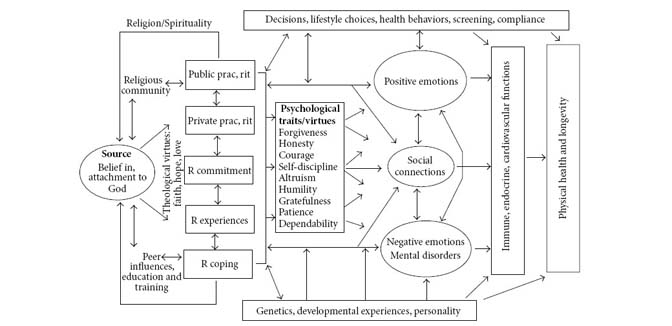
Theoretical model of causal pathways to physical health for Western monotheistic religions (Christianity, Islam, and Judaism). Original source: Koenig et al.
Review Article: “Religion, Spirituality, and Health: The Research and Clinical Implications,” Harold G. Koenig, 2012. Published by International Scholarly Research Network, ISRN Psychiatry, Volume 2012, Article ID 278730, 33 pages
Summary:
This paper provides a concise but comprehensive review of research on religion/spirituality (R/S) and both mental health and physical health. It is based on a systematic review of original data-based quantitative research published in peer-reviewed journals between 1872 and 2010, including a few seminal articles published since 2010. First, I provide a brief historical background to set the stage. Then I review research on R/S and mental health, examining relationships with both positive and negative mental health outcomes, where positive outcomes include well-being, happiness, hope, optimism, and gratefulness, and negative outcomes involve depression, suicide, anxiety, psychosis, substance abuse, delinquency/crime, marital instability, and personality traits (positive and negative). I then explain how and why R/S might influence mental health. Next, I review research on R/S and health behaviors such as physical activity, cigarette smoking, diet, and sexual practices, followed by a review of relationships between R/S and heart disease, hypertension, cerebrovascular disease, Alzheimer’s disease and dementia, immune functions, endocrine functions, cancer, overall mortality, physical disability, pain, and somatic symptoms. I then present a theoretical model explaining how R/S might influence physical health. Finally, I discuss what health professionals should do in light of these research findings and make recommendations in this regard.
 Harold G. Koenig, M.D.
Harold G. Koenig, M.D.
Director, Center for Spirituality, Theology and Health
Professor of Psychiatry & Behavioral Sciences
Associate Professor of Medicine
Duke University Medical Center
Adjunct Professor, Department of Medicine, King Abdulaziz University, Jeddah, Saudi Arabia
Adjunct Professor, Department of Public Health, Ningxia Medical University, Yinchuan, People’s Republic of China
Adjunct Professor, Department of Psychiatry, School of Osteopathic Medicine, Campbell University, Buies Creek, North Carolina
Visiting Professor, Shiraz University of Medical Sciences, Shiraz, Iran
Article submitted by Michael McIntyre
